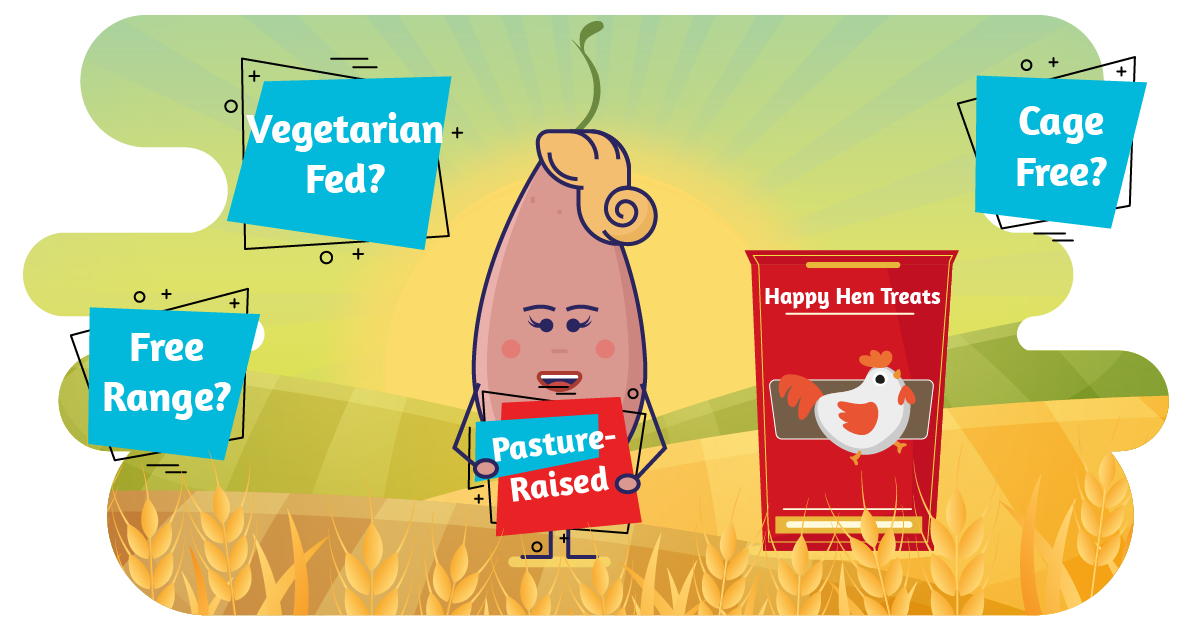"Cage Free," "Free Range," "Pasture-Raised"...What is Best for Chickens?
Share

If you think, YOU hate asterisks, you should speak to a hen.
Human beings know to look for asterisks and read all the fine print, because crooked individuals will rip us off if we don’t. It’s much more dire for hens and other farm fowl. An asterisk is the difference between a healthy, happy life...and a miserable one.
There are so many trend-words that are stuck on packaging for eggs and other chicken products. It’s easy to think you’re making a conscious purchase, but if you don’t understand what these words actually mean, you may be helping to fund unpleasant—even inhumane— living conditions for these animals.
Learn more about the following terms to understand what you’re buying and, more importantly, what you should (or shouldn’t) be buying.
“CAGE FREE”
“Cage Free” means exactly what it sounds like. No cages.
Take 100 chickens and cram them into a chicken coop, or 10,000 chickens and cram them into an industrialized “barn.” You’ve accomplished “Cage Free” status.
The USDA has many standards that require minimum effort to achieve, and “Cage Free” is perhaps the most misleading. And that’s why you’ll see it on more packaging than any of the other terms. These poor birds won’t see the inside of a cage, but they won’t necessarily see the outdoors either.

“FREE RANGE”
This term creates romantic imagery of chickens wandering great fields in rural America. Unfortunately, the USDA only requires outdoor time to qualify as “Free Range”...but it places no stipulations on how much room, or how long the chickens spend outdoors.
For example, a Hancock associate once witnessed a man in the Bronx who maintained a small coop on the roof of an apartment building. The birds could wander the roof (filthy with bird waste) at will, when they weren’t hiding from the city’s extreme temperature swings. They were, technically, “Free Range.”
What’s worse is that the “Free Range” tag can be used to hide unpleasant living conditions. For example, an owner could keep chickens in cages for the entire day, and let them outside for five minutes, before returning them to the cage. Now no one will question whether it’s “Cage Free” because the packaging says “Free Range.” Beware.
“VEGETARIAN-FED”
The Hancock Social Media Page has often served as an arena for arguments about vegan, vegetarian, and omnivorous lifestyles. And that’s OK. Although I personally prefer to supplement my diet with meat, humans have the free will and scientific know-how to live perfectly normal lives as herbivores.
Chickens don’t.
They are born omnivores, eating both plants and animals. Unlike humans, chickens can’t drive to the supplement store and find replacements for the insects in their diet. “Vegetarian” chickens therefore tend to be unhealthy chickens. More often than not, their owners are trying to be cheap instead of compassionate. Chickens need a food source that provides a range of forage and insects to munch.
“PASTURE RAISED”
At this point in the post, you’re probably feeling cynical. Good news: “Pasture Raised” is a trend you can believe in.
Admittedly, there is still work to be done in creating guidelines for what constitutes “Pasture Raised,” but for now it is understood to mean raising chickens primarily outdoors. This means that they eat homegrown grains and forage, as well as the insects attracted to this fare.
The best news is that you can do more than just feel good about yourself for buying “Pasture Raised.” This method of raising hens produces the most delicious, nutritious eggs!
Hancock’s Happy Hen Forage Seed Mix is the perfect pick for those looking to keep “Pasture Raised” chickens. It packs all of the nutrition that a natural diet provides, and it’s easy to establish on your property. The only tough part is making sure your chickens don’t get at it before it’s fully established! You’ll want the plant to be fully grown before you let your hens get their fill.
Support those who raise chickens the right way. And if you are interested in raising chickens, get ahead of the trend and go “Pasture Raised”!















